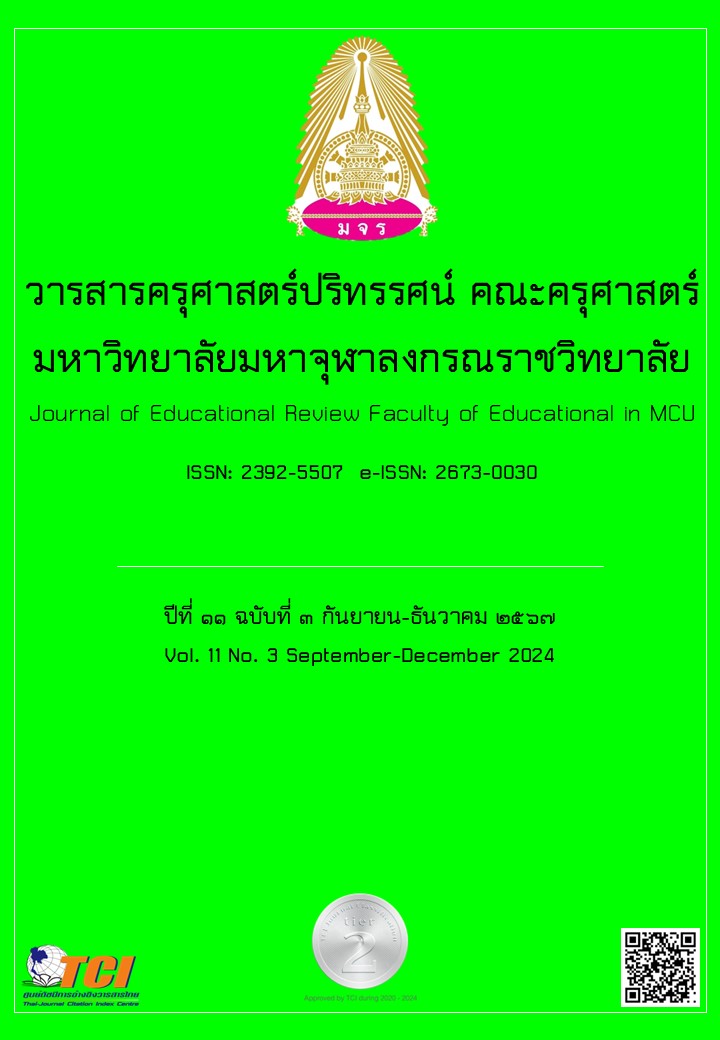GROWTH MINDSET DEVELOPMENT: A CASE STUDY OF ADMINISTRATORS IN ROYAL AWARDED ELEMENTARY SCHOOLS IN PHATTHALUNG
Main Article Content
Abstract
This qualitative case study research aims to investigate the development of the growth mindset of administrators in Royal awarded elementary schools in Phatthalung. Key participants recruited by purposive sampling were ten people, including two school administrators, four teachers, two heads of the academic administration, and two heads of the general administration. A semi-structured interview protocol served as the primary tool for gathering research data. Content analysis was employed to do the data analysis. The credibility of this study was enhanced through the strategic use of rapport and peer debriefing. The result reveals that the development of the administrators' growth mindset includes: 1) believing in intellectual capability: the administrators possess knowledge, morality, dignity, vision, and ability to apply theories to their school administration; 2) being open to new challenges: the administrators are enthusiastic and confident to consider challenges as opportunities by building networks and opening to modern technology; 3) searching for role models and inspiration: the administrators seek for the role models to follow for their achievements and rewards; 4) accepting opinions and criticism from personnel: the administrators are open to everyone's opinions and learn from feedback; 5) persistence to obstacles: the administrators consider problems as opportunities and have confidence in their abilities to handle problems; and 6) resilience and flexibility: the administrators are open-minded and adapt to different situations.
Article Details

This work is licensed under a Creative Commons Attribution-NonCommercial-NoDerivatives 4.0 International License.
ทัศนะและความคิดเห็นที่ปรากฏในบทความในวารสารฉบับนี้ถือเป็นความรับผิดชอบของผู้เขียนบทความนั้นเพียงผู้เดียว และไม่ถือเป็นทัศนะและความรับผิดชอบของกองบรรณาธิการ
กองบรรณาธิการขอสงวนสิทธิ์ในการคัดเลือกบทความลงตีพิมพ์และจะแจ้งให้เจ้าของบทความทราบหลังจากผู้ประเมินบทความตรวจอ่านบทความแล้ว
ต้นฉบับที่ได้รับการตีพิมพ์ในวารสารครุศาสตร์ปริทรรศน์ คณะครุศาสตร์ มหาวิทยาลัยมหาจุฬาลงกรณราชวิทยาลัย ถือเป็นกรรมสิทธิ์ของคณะครุศาสตร์ มหาวิทยาลัยมหาจุฬาลงกรณราชวิทยาลัย ห้ามนำข้อความทั้งหมดหรือบางส่วนไปพิมพ์ซ้ำ เว้นเสียแต่ว่าจะได้รับอนุญาตจากมหาวิทยาลัยฯ เป็นลายลักษณ์อักษร
References
กุสุมา ยกชู. (2561). การศึกษาและเสริมสร้างกรอบคิดงอกงามของนักศึกษาวิชาชีพครู. ดุษฎีนิพนธ์ปรัชญาดุษฎีบัณฑิต. มหาวิทยาลัยศรีนครินทรวิโรฒ.
เถลิงศักดิ์ อาจธรรม, สุดารัตน์ สารสว่าง และสุชาดา นันทะไชย. (2565). ความสัมพันธ์ระหว่างภาวะผู้นำเชิงปฏิรูปกับกรอบความคิดแบบเติบโตของครู สังกัดองค์กรปกครองส่วนท้องถิ่นในเขตจังหวัดนนทบุรี. วารสารมหาวิทยาลัยศิลปากร. 42(6). 62-73.
พิมพ์ตะวัน จันทัน. (2563). การศึกษา GROWTH MINDSET จากการสอนโดยใช้เทคโนโลยีเพื่อสร้างสรรค์นวัตกรรมความเป็นพลเมืองดิจิทัลของนิสิต คณะสังคมศาสตร์ มหาวิทยาลัยศรีนครินทรวิโรฒ. วารสารวิทยาลัยสงฆ์นครลำปาง. 9(1). 98-105.
ยงยุทธ ขำคง และสรวงภรณ์ สัจภาพพิชิต. (2564). GROWTH MINDSET: เปลี่ยนวิธีคิดในปัจจุบันเพื่อความสำเร็จในอนาคต. วารสารวิชาการมหาวิทยาลัยราชภัฏพระนคร. 12(2). 369-387.
ยาใจ พงษ์บริบูรณ์. (2553). การศึกษาแบบกรณีศึกษา: Case Study. วารสารศึกษาศาสตร์ มหาวิทยาลัยขอนแก่น. 33(4). 42-49.
ละอองดาว ชาวกงจักร์ และธีนะดา ภิญโญ. (2561). แนวทางการพัฒนาภาวะผู้นำครูโดยใช้กรอบความคิดเติบโตของข้าราชการครู โรงเรียนสังกัดสำนักงานเขตพื้นที่การศึกษามัธยมศึกษา เขต 3 จังหวัดนนทบุรี. วารสารครุศาสตร์อุตสาหกรรม. 17(2). 151-159.
วิศรุต นุชพงษ์. (2561). ผืนดินและแผ่นฟ้าแห่งการงอกงาม: ผู้เรียนและบริบทของการมีกรอบความคิดแบบเติบโตของนักเรียนในโรงเรียนขยายโอกาส: กรณีศึกษา นักเรียนมัธยมศึกษาตอนต้นในโรงเรียนขยายโอกาสประเภทโรงเรียนขนาดเล็ก สังกัดกรุงเทพมหานคร. วิทยานิพนธ์ศึกษาศาสตรมหาบัณฑิต. มหาวิทยาลัยธรรมศาสตร์.
สมชาย เทพแสง. (2565). ผู้นำกับการคิดแบบพัฒนา. วารสารสหวิทยาการวิจัยและนวัตกรรมการศึกษา. 1(2). 1-12.
อรพิน โคตวิทย์, วัลลภา อารีรัตน และเกื้อจิตต์ ฉิมทิม. (2563). ความต้องการจําเป็นในการพัฒนากรอบความคิดแบบเติบโตของครูในโรงเรียน สังกัดสํานักงานเขตพื้นที่การศึกษาประถมศึกษาอุดรธานี เขต 3. วารสารบริหารการศึกษา มหาวิทยาลัยขอนแก่น. 16(2). 141-153.
อรรถชัย ศรีวรภัทร. และสืบสกุล นรินทรางกูร ณ อยุธยา. (2563). แนวทางการพัฒนาผู้บริหารโรงเรียน สังกัดสำนักงานเขตพื้นที่การศึกษาประถมศึกษากระบี่ ตามกรอบความคิดแบบเติบโต. วารสารการบริหารและนวัตกรรมการศึกษา. 3(3). 40-63.
Beziat, T. L., Bynum, Y. & Klash, E. F. (2017). Metacognitive Awareness and Mindset in Current and Future Principals. School Leadership Review. 12(2). 23-31.
Blackwell, L. S., Trzesniewski, K. H. & Dweck, C. S. (2007). Implicit theories of intelligence predict achievement across an adolescent transition: A longitudinal study and an intervention. Child Development. 78(1). 246-263.
Drago-Severson, E., Blum-DeStefano, J. & Asghar, A. (2013). Learning for Leadership: Developmental Strategies for Building Capacity in Our Schools. London: Corwin.
Dweck, C. (2006). Mindset: The New Psychology of Success: How We Can Learn to Fulfill our Potential. New York, NY: Ballantine.
Dweck, C. (2012). Mindset and Malleable Minds: Implications for Giftedness and Talent. In R. Subotnik, A. Robinson, C. Callahan, & E. Gubbins (Eds.), Malleable Minds: Translating Insight from Psychology and Neuroscience to Gifted Education. Storrs, CT: National Research Center on the Gifted and Talented, University of Connecticut.
Education Week Research Center. (2016). Mindset in the Classroom A National Study of K-12 Teachers. From https://epe.brightspotcdn.com/0d/a4/49a22bcf4f899a36427c6d7859c6/ewrc-mindsetintheclassroom-sept2016.pdf Retrieved February 28, 2024.
Fraenkel, J. R. & Wallen, N. E. (2006). How to design and evaluate research in education. 6th ed. New York, NY: McGraw-Hill.
Grünbaum, A. (2007). The reception of my Freud-critique in the psychoanalytic literature. Psychoanalytic Psychology. 24(3). 545-576.
Guest, G., Bunce, A. & Johnson, L. (2006). How many interviews are enough? An experiment with data saturation and variability. Field methods. 18(1). 59-82.
Haimovitz, K. & Dweck, C. (2016). What predicts children's fixed and growth intelligence mind-sets? Not their parents' views of intelligence but their parents' views of failure. Psychological Science. 27(6). 859-869.
Hildrew, C. (2018). Becoming a Growth Mindset School. London: Routledge.
Jennings, C. & Cuevas, J. A. (2021). Teacher Impact on Student Growth Mindset. Perspectives In Learning. 19(1). 23-38.
Masalee, N., Ariratana, W. & Sirisooksilp, S. (2021). Developing Factors and Indicators of Growth Mindset for School Administrators in Thailand. International Educational Research. 4(1). 61-70.
Miller, S. (2022). Teacher Mindset Affects School Culture. (Master's degree), Education, Northwestern College, Iowa. From https://nwcommons.nwciowa.edu/education_masters/437/ Retrieved March 10, 2024.
Morse, J. M. (2000). Determining sample size. Qualitative health research. 10(1). 3-5.
Patton, M. Q. (2002). Qualitative research and evaluation methods. 3rd ed. Thousand Oaks, CA: Sage Publications.
Paunesku, D., Walton, G. M., Romero, C., Smith, E. N., Yeager, D. S. & Dweck, C. S. (2015). Mind-set interventions are a scalable treatment for academic underachievement. Psychological Science. 26(6). 784-793.
Seidman, I. (1998). Interviewing as qualitative research: A guide for researchers in education and the social sciences. 2nd ed. New York: Teachers College Press.
Stake, R. E. (1988). Case Study Methods Education Research: Seeking Sweet Water. In R. M. Jaeger (Ed.), Complementary Method for Research in Education. Washington, D.C.: American Educational Research Association.
Yeager, D. S. & Dweck, C. (2012). Mindsets that promote resilience: When students believe that personal characteristics can be developed. Educational Psychologist. 47(4). 302-314.
Yin, R. K. (2014). Case study research: Design and methods. Thousand Oaks, CA: Sage.


